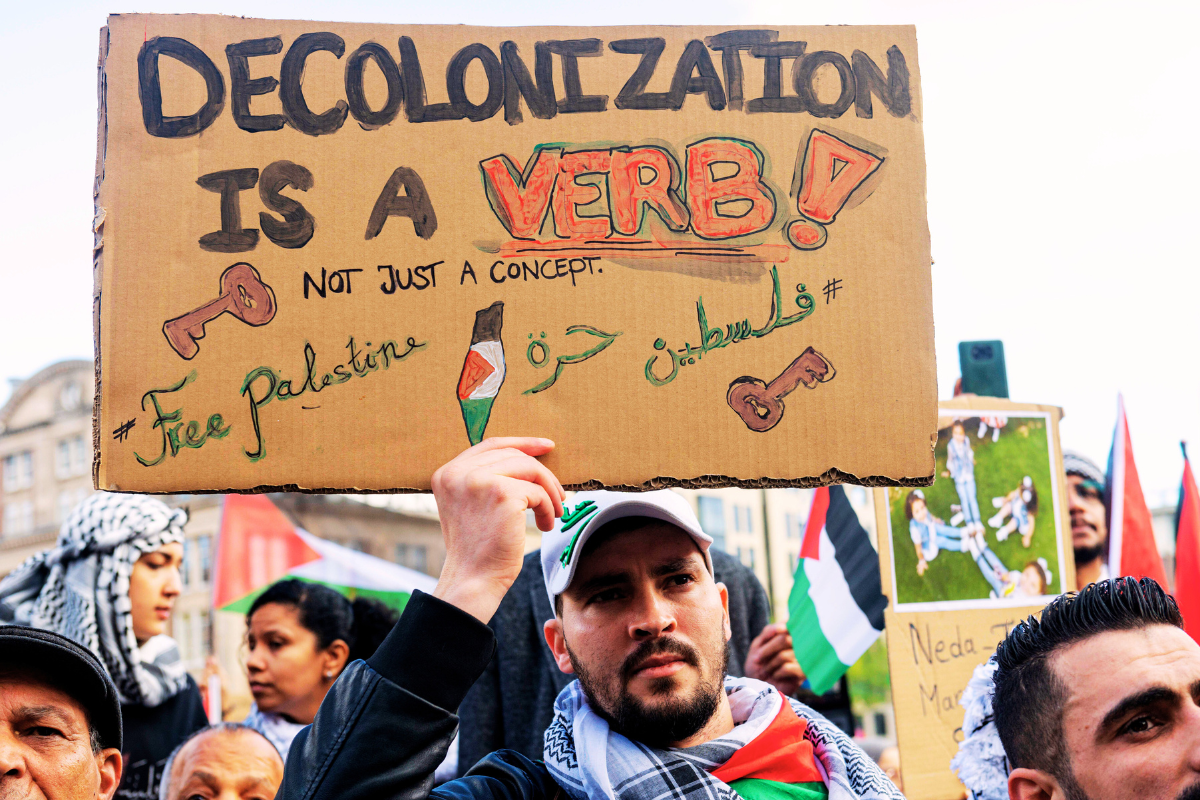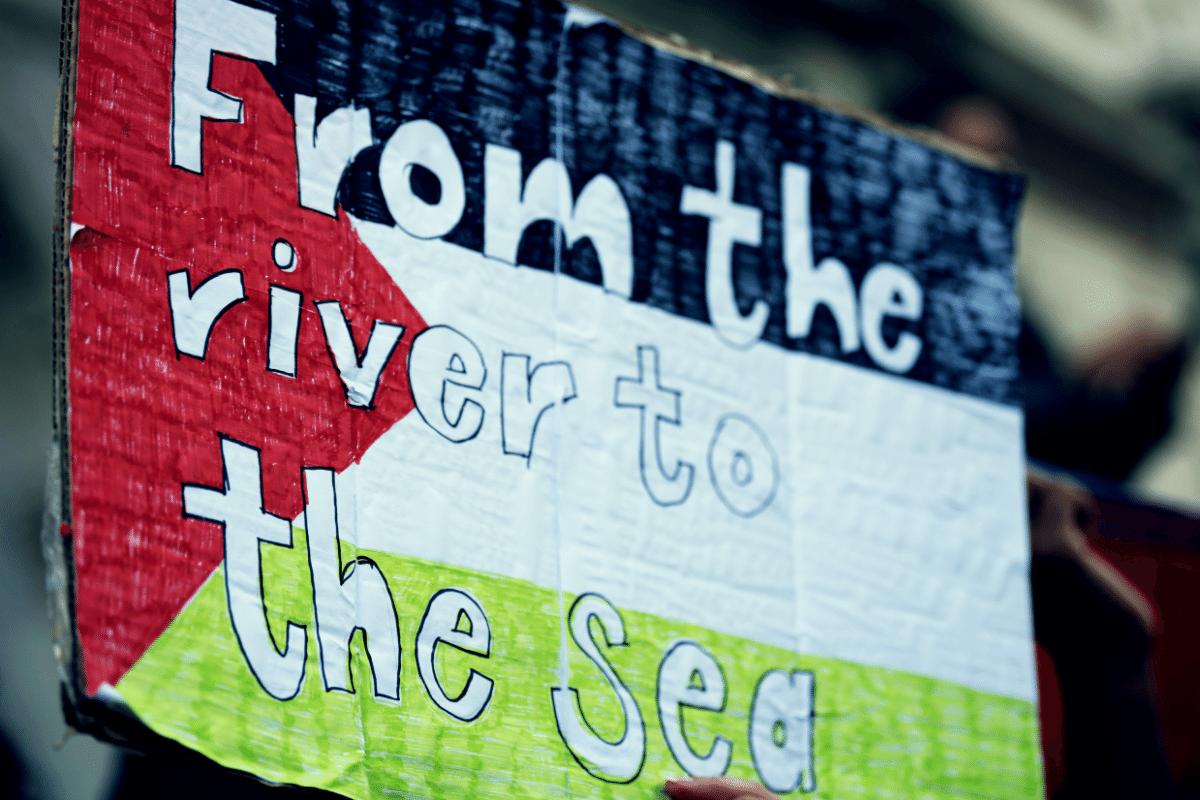Israel
From the River to the Sea: The Significance of a Slogan
Not all of those who advocate for a single state “from the river to the sea” have genocidal intent, but their recommendation, if acted upon, is very likely to result in either the genocide or ethnic cleansing of Jews.

The phrases “from the river to the sea” and “Palestine will be free” serve as a call and response in many protests on behalf of Palestinians or against Israel. Both the prevalence and the controversy surrounding the refrain “from the river to the sea” have increased since Hamas’s 7 October attack. Congresswoman Rashida Tlaib was recently censured by the US House of Representatives, in part for her endorsement of the slogan.
The relevant river is the Jordan, and the sea is the Mediterranean, which bound the geographical area that includes Israel, Gaza, and the West Bank. How are we to interpret this call? Some critics see it as a call for genocide against Jewish Israelis, while some supporters propose that it has an entirely benign meaning. But according to any reasonable interpretation, the slogan is a call for the end of the state of Israel. If Palestine extends “from the river to the sea,” that leaves no place for the Jewish nation.
This is certainly how the slogan was initially used. It was popularized in the 1960s, well before some Palestinians finally agreed, in the early 1990s, to any possibility of two states existing between the Jordan and the Mediterranean. The slogan, like the map of Palestine on the Palestinian Liberation Organization’s emblem, originally allowed no place for Israel. The map on the emblem remains unchanged.
The slogan’s meaning could have changed, but there are limits to its possible new meanings. Those who deny that Palestinian use of “from the river to the sea” precludes the existence of Israel must concede (implausibly) that when the Israeli right uses the same slogan, there is no denial of a prospective Palestinian state alongside Israel.

Many critics of the Palestinian slogan want to go further and claim that it is a call for genocide against the Jews in Israel. There are certainly some people, including Hamas, who mean precisely this. Hamas expresses this genocidal fantasy in its Charter and the 7 October attack has provided yet more evidence that they mean what they say, as have their promises to repeat such attacks until Israel is annihilated.
Once a chant is used with genocidal intent by enough people, anybody else claiming to use it in a benign way knows that it might reasonably be interpreted as either noxious or at least ambiguous.
Context does matter, but only within reason. For example, if a group with a suspected antisemitic agenda were parading with a swastika, they wouldn’t fool anyone if they explained that the swastika is a symbol of divinity in eastern religions. It is not that this claim is false. It’s that we wouldn’t believe that that is why they are brandishing the swastika.
The fact that the “from the river to the sea” chant is associated with genocidal aspirations should be an even stronger consideration for those progressives who eschew even the mention—as distinct from the use—of racial slurs. (To mention a slur is to refer to it, rather than wield it.) If you will not even mention the slurs that others use, it is harder to justify using the slogans of those calling for genocide.
And what is the possible benign meaning of “from the river to the sea”? It is that Jews and Palestinians should live freely as equals in a single state. Because that state would be Palestine, there is one sense in which even this interpretation calls for the end of the State of Israel. However, some might suggest that this is merely a semantic issue. According to this view, the name of the envisaged state does not matter. What matters is that it would be a single state, in which all citizens would be equal.
For example, Oxford University’s Ahmad Khalidi says that it “is perfectly possible for both people to be free between the river and the sea.” But this depends on what one means by “possible.” One can certainly imagine a hypothetical world in which Jews and Palestinians could live as equals in a single Palestinian state. But is such a scenario possible in the actual world? Is it a realistic aspiration—an actionable political agenda?
Almost certainly not. While the State of Israel has a large Arab minority—about 20 percent of the population—who are equal citizens (even though, as a minority, they experience some disadvantages), there is no reason to think that Jews—or Arabs, for that matter—could live freely in a single state between the river and the sea.
Part of the evidence for this is that there is no state in the region in which anybody lives as freely as both Jewish and Arab Israelis do. With the exception of Israel, liberal democracies simply do not exist in the Middle East. (Turkey was once a refreshing exception, at which time it had warm relations with Israel, but it has declined into a substantially authoritarian state, and has become increasingly antagonistic towards Israel.)

There is thus no reason to think that replacing Israel with a single Palestinian state would magically extend liberal democratic sensibilities, already under threat in Israel, to populations where they have never had any traction.
And there is a further piece of evidence to suggest that implementing the “one-state solution” would be a recklessly dangerous experiment. As long as the Palestinian polity includes significant elements, such as Hamas and Palestine Islamic Jihad, that do have genocidal intent towards Jews, it would be suicidal for Israeli Jews to agree to a state that included such people. The events of 7 October have made this even clearer than it already was.
Some want to suggest that these pathologies in Palestinian society are merely the products of the “occupation.” That is not only ahistorical—because Palestinian violence against Jews preceded even the establishment of the State of Israel—but also “asociological.” Hamas is far from the only Islamist organization characterized by antisemitism, homophobia, intolerance, misogyny, religiously motivated violence, and other illiberal traits. It has all this in common with the Taliban, Al-Qaeda, ISIS, Boko Haram, the Muslim Brotherhood, Hizb ut-Tahrir, and many other groups. One must either recognize that the Hamas pathology is part of a more general phenomenon, or indulge in full-throttle paranoia by blaming that transnational pathology on Zionism.
Those who recommend the one-state “solution” in Palestine should ask themselves why they do not also recommend a “one-state solution” for the world. If lands should not sometimes be divided into separate states for different peoples, why should the world be divided into different countries? Why not have a single, global government ruling over not only Europe, Canada, the United States, and Australia, but also Russia, China, North Korea, the Middle East, and all of Africa. How do they think that would work out? Would liberal democracy become a worldwide phenomenon, or would those rare islands of freedom, where only a minority of humans live, be swallowed up by the dysfunctionality that characterizes most of the planet?
Not all of those who advocate for a single state “from the river to the sea” have genocidal intent, but their recommendation, if acted upon, is very likely to result in either genocide or the ethnic cleansing of Jews from the only remaining part of the Levant where they live in significant numbers.
Academics like Peter Beinart and others might not feel threatened by the words “from the river to the sea” when they are chanted by those who have “a vision of equality and mutual liberation.” However, such utopian visions are often delusional. Fantasists can afford to indulge such delusions. Those who live in the real world cannot.






